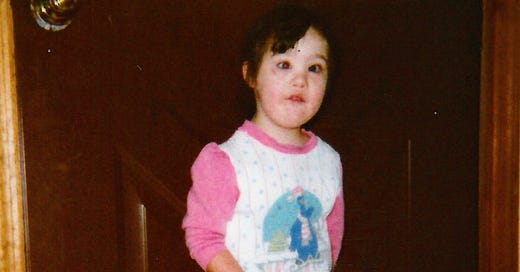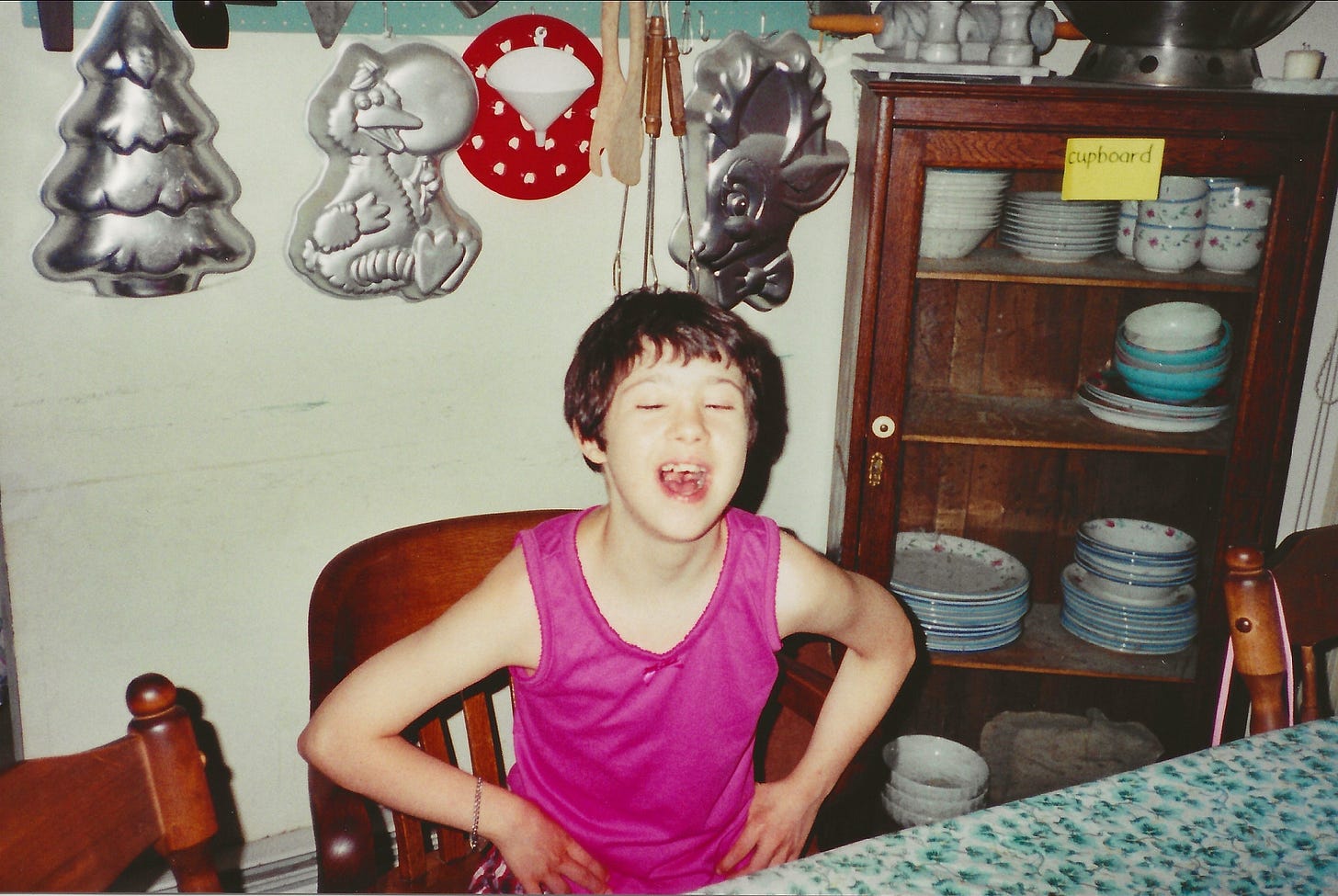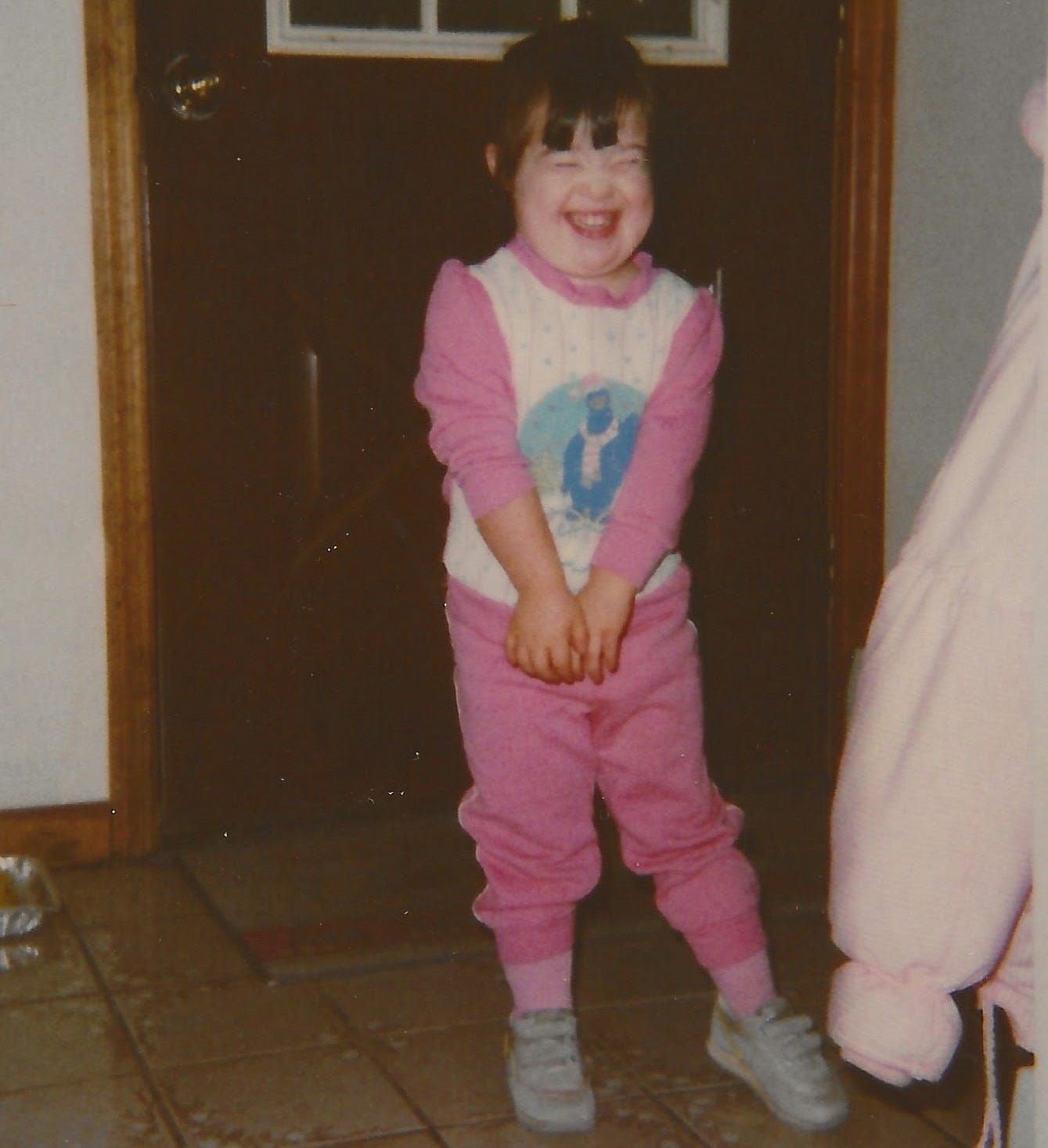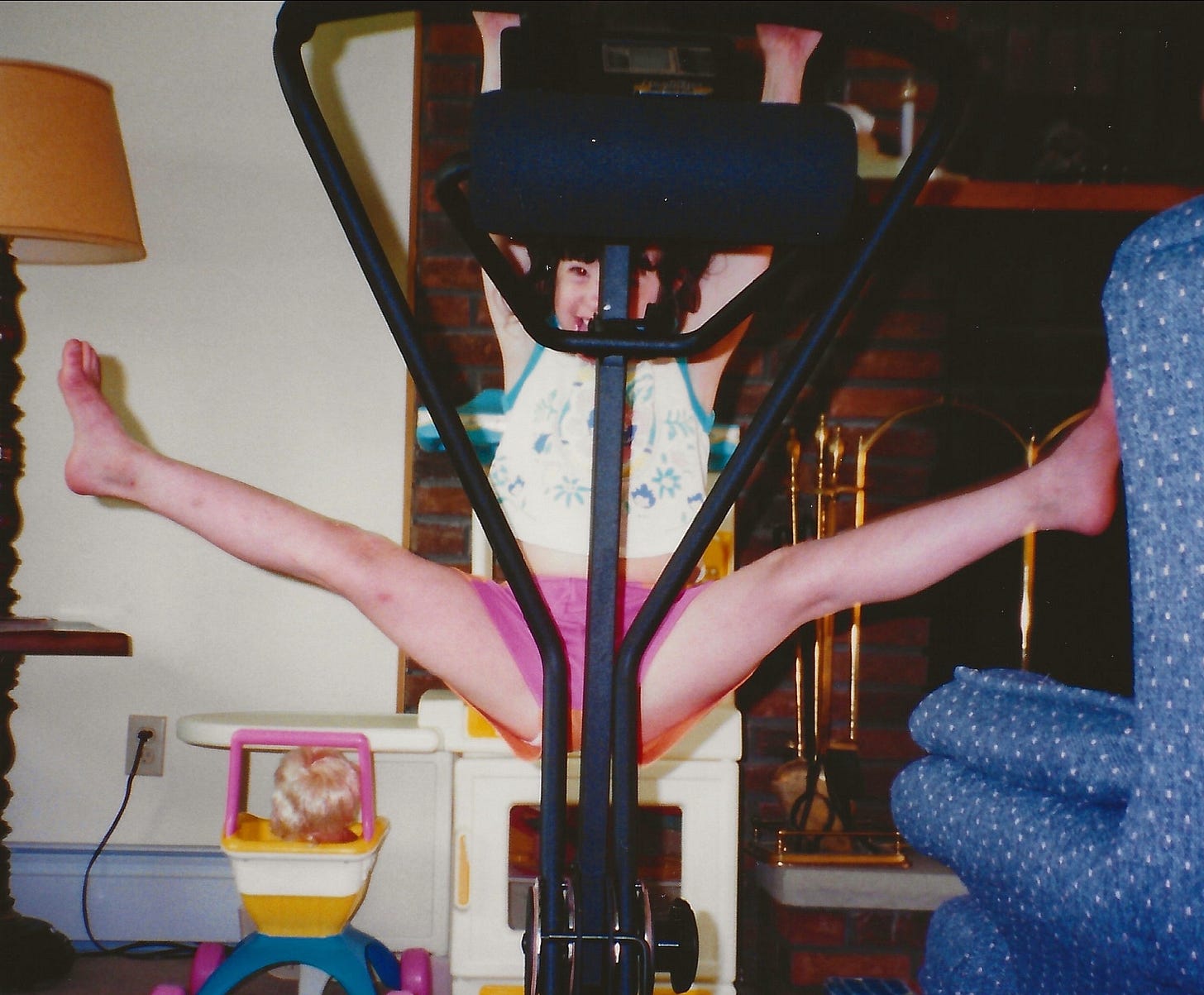This was an open letter written to professionals working with Sheila in 1990. Sheila was a 3-year-old at the time, and I was a frustrated momma. Over the years “deficit thinking kept creeping into report writing and language used around Sheila.” We’d beat it back with one group of professionals and it would pop up elsewhere, like the much-maligned dandelion. I’d had my fill of it, so, I dug this letter out of my archives and presented it again as needed, in nurse talk “PRN.”
It’s a bit disconcerting to read something in present tense now that Sheila has died, but I left it as is.
First published in a local Down Syndrome Newsletter, picked up by other local and national newsletters both in the USA and abroad. Eventually it was published in a parenting magazine, January 25, 1997.
An open letter to all professionals working with Sheila:
Before you start thinking, Nancy is really losing her grip on reality, please, remain open and hear me out.
Sheila does not have a disease. There are no pills or therapies that can make her all better. All the segregated "programs" in the world cannot change who or what she is. She will always remain a person with Down syndrome. Sheila is not a "Down syndrome kid". That places the emphasis on the wrong thing. She is first and foremost a child. There are many, I'm sure, who would like to point out that she will always remain a child. Unfortunately, that could be true if we persist in treating her as one, treating her as less of a person than she is.
Deficit- or Strength-based Thinking
Deficit thinking: that is something that I want out of her program - there is no room for it here. Take a look at her strengths and build on those. We cannot play a game of catch up with her because she can never catch up. It is a waste of time and energy to try. I'm reminded of the Serenity prayer: "God, grant me the serenity to accept the things I cannot change, courage to change those things I can, and the wisdom to know the difference." We cannot change the fact that Sheila has Down syndrome. We cannot change the presence of delays, but we can change how we deal with it. We can change how we choose to achieve goals. We can change how we deliver therapy. We can change the setting. We can change the delivery system. We can change our attitudes.
Since there are so many things we can change, let's work together to make those changes. The first thing we all need to do is to take out our attitudes, and under close examination look at how they may actually hamper Sheila's progress. I am concerned about placing her developmental age in her records, because I already see people treating her at that age level, rather than at her functional level. Sheila can and does function at a higher level at home because that is what we expect of her. If for some reason she does not always meet our expectation, we assume it is because she is a child, not because she is “retarded.” (Remember: in music the word ritardando means to slow down. Or in Sheila’s words, “retarded doesn’t mean stupid, mooommm.”)
The deficit thinking model has to go. That's the one that lists all the things Sheila is unable to do and ignores what she can do. "But the state wants . . .“ The state wants to know that the money they are being dunned for is actually being utilized to educate the special needs child. So, get together as a large group of professionals, along with parents, and let the state know we all need to make changes. If this is a parent driven system, then aid the parents in driving the system, don't put up roadblocks in our way.
Fostering Dependence or Fostering Independence
We want Sheila to be independent as an adult. It cannot happen if she has limited to no contact with her peers. She has to know how to interact with her peers, and that does not happen in a self-contained setting. It is like living in a bubble. She can see the outside world, but she can't be part of it. That is a rather cruel and unnecessary punishment for her, just because she does not have the same number of chromosomes you and I have. Sheila will never be a rocket scientist, but I haven't been separated from society for these same lacks, so why do we do this to children with developmental delays? Our children deserve the same opportunities, in the same settings as the rest of us, to develop their full potential.
What Do You See?
When I look at Sheila, I see a delightful, engaging kid with a mischievous sense of humor. What I hear from you is that you see a child with significant delays who "desperately" needs a program. This leads me to believe that you are unable to see anything positive about her. I do not deny that Sheila will need support in order to succeed (don't most of us?) But I know she will have a much better chance at success if her supports occur in a typical, average, "normal" setting.
Children have this inner-directed driving force propelling them forward. I have read and heard from enough professionals telling me that this force is somehow deficient or absent in children with Down syndrome. Please be careful with stereotypes, for that is what this is. All the stereotypes and preconceived notions you have about our children may in effect limit them, because you are simply unable to see past the stereotypes.
Rigidity vs. Flexibility
I am concerned about the rigid structure that I see in so many "center based" programs. When do our kids get to be kids? Kids learn best from other kids - trust them to do their own work just a little, you may be surprised. The last few times I have been in to observe my daughter, I have observed children shutting down, as if they are on sensory overload and shut down to protect themselves. Kids cannot learn when this takes place. What are you doing to their self-esteem? When children consistently hear the message do it our way (not your way), the potential for feeling bad about themselves is heightened. I know that is not what you want to do, but we do need to be careful that the treatment does not compound the problem.
The Importance of Parental Observations
We, the parents of your charges, spend time living with, observing, and interacting with our children. There are no tests devised that will give you the knowledge we possess simply by being our children's parents. We can all benefit from each other's knowledge. The best part of this is that our children stand to gain the most when we work together. Working together implies you will hear and implement our desires as well as your own.
Acceptance and Impact on Potential
I feel we are fighting for acceptance of our child AS SHE IS. My perception of perfection has made a dramatic shift since we gave birth to Sheila. She is as whole and complete as any of us. She has her own set of imperfections, as do the rest of us. Do we need help from professionals at times? I believe the answer is yes, but it is support, encouragement, therapies that occur within the framework of what we believe is right for our current needs. This is true for Sheila, too. Sheila is who she is. She has Down syndrome, but she isn't a "Down syndrome kid". She has developmental delays, but this does not mean she cannot develop. She will develop a better sense of age-appropriate behavior if she is with typical kids her age. Sheila “ain't” broke, so don't keep trying to fix her. Instead, help us help her grow and develop to her full potential.
Addendum: And the professionals did get it together and really rallied around Sheila’s needs. Sheila was never going to be a rocket scientist, but then most of us aren’t one either. What Sheila was destined to be was someone who recognized that love was the best gift she could give and she shared her love for life generously.










Nancy, these photos of Sheila are precious. As I read, I was rallying in my heart for you and for Sheila. I remember having to educate some of Sarah's specialists on the use of language concerning her diagnosis and personhood--that who she is as a person is not limited to, nor defined by, her diagnosis but that her diagnosis was, of course, an aspect of her life that required support.
I could see your mama's heart in this letter advocating for Sheila. And I know how much you love her, Nancy. I'm so grateful you keep sharing her with us.
I agree so much with everything you say. If all of us could look at other people with eyes that saw first all that they were capable of, how differently we would see the world. Using people’s strengths as a foundation upon which to build, and as a springboard to further growth….how inspired, and how inspiring! What a wonderful way to choose to look at the world and at our fellow travelers in life.